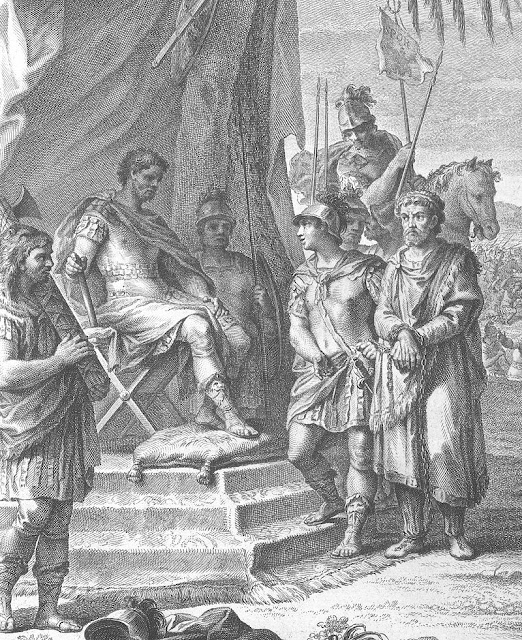
In 108 BC, the Romans decided to send huge military reinforcements to invade the country of the Numidians in the depths. The Romans were able to encircle cities in the south, but the inhabitants preferred to burn all their possessions and what their cities contained of gold and silver, but rather burned themselves preferring death to their submission to the Roman. In the summer of 107 BC, the Romans burned Gafsa, killing all the men and making the women slaves and the children slaves. In the spring of 106 BC, a Roman military expedition roamed the borders of the Numidians and the Moors near the Moulouya River and seized all the treasures of Yogurta that they had hidden there. In the face of this invasion, the king of the Numidians, Yogurta, allied with the king of the Moors in the Far Maghreb, his son-in-law, Pocos I, after convincing him that the Romans were an unjust and savage people, the enemy of humanity, who only cared about extending their control over others. Leaders of the peoples of North Africa.
The two Berber kings moved with their armies towards Constantine, which was occupied by the Romans after they made it a repository for their spoils and a prisoner of their prisoners of the Berber people who supported Yogurta. There were many wars in which the Berbers were almost victorious, but Pocos I saw to follow the path of diplomacy and dialogue against Jogerta, who insisted on the need to continue the wars against the Roman leader Marius. Once again, the Romans succeeded in persuading Pocos I, king of the Moors, to ally with them to end the war (divide and rule). Is not war a trick? Is not war a fight, escape, reconcile and stop fighting? Because of this, King Pocos I of history has been accused of treachery against his ally and son-in-law, Aklid Yogurta. Is it treachery or is it wisdom to overturn alliances in the face of the mighty power of the Romans?
Bukos I inherited his kingdom from the chief Baga, but he seized the opportunity of the defeat of Jogerta before the Roman armies to seize the western part of the Kingdom of the Mazellians in Algeria. King Pocos I exercised his absolute power within the limits of his military capabilities and within the limits of dealing with tribal factions. He had a shura of relatives, friends, and some tribal leaders, and he had a bureau for writing and managing the affairs of the army. Pocos I used to move between several capitals, among them Tingi (Tanga), Sika, Tamouda and Volili. He minted coins in his name, appointed five ambassadors to liaise with Rome, and assigned command of military operations to his son Volux.
Pocos I died between the years 80 and 70 BC, then the kingdom was divided between his two sons into two halves, the first part ruled by Pocos II, and the second part ruled by Bukud. Both were strong allies of General Cesar, the Roman, against the Mazilian king Juba I, who had allied with the Sinae in Rome. When Caesar was killed, the two brothers differed in favor of Pocode, General Antoine, and Pocos II followed Octave, governor of Rome. In the year 38 BC, Pocius II was killed, so that his brother Boucod would claim the king after Octave's victory over Antoine. When Boukoud died in 33 BC, he did not leave behind a punishment, so Rome extended its political influence over Tangier Mauritania, and Prince Juba II took over in the year 25 BC, who took care of his upbringing after the death of his father Juba the first by suicide.
